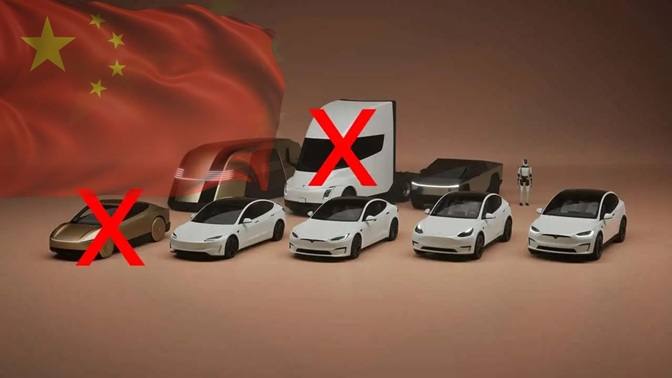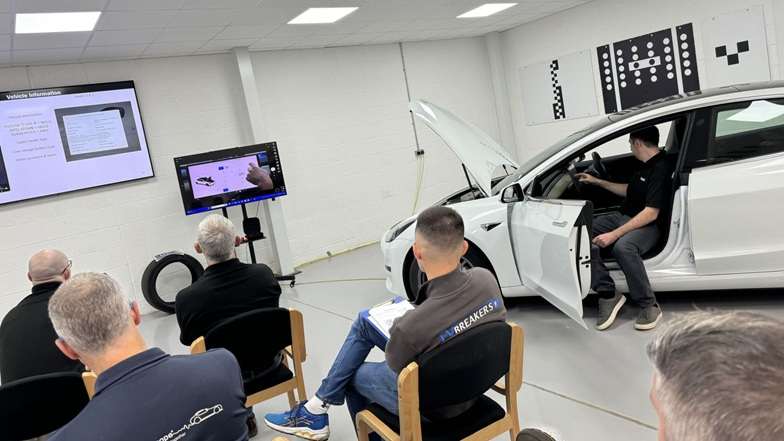Tesla’s ambitious dreams of launching a futuristic $30,000 self-driving Cybercab and ramping up production of its long-promised all-electric Semi truck just ran into a massive roadblock — and it’s not a software glitch or battery supply issue this time. Instead, it’s a full-blown geopolitical trade war.

According to a recent Reuters report, Tesla has hit the brakes on importing crucial components from China for both vehicles. The reason? A jaw-dropping 145% import tariff imposed by the U.S. government on Chinese-made goods.
A Road Paved with Tariffs
Tesla had been carefully planning to import parts for both its Cybercab (robotaxi) and its Semi truck, with the idea of kicking off trial production by the end of 2025, followed by full-scale manufacturing in 2026. The Cybercab would be built in Texas, and the Semi would roll out from Nevada.
Originally, Tesla was ready to stomach the 34% tariffs on Chinese imports. That was already a big hit, but manageable. However, when President Donald Trump escalated tariffs to a staggering 145%, Tesla had no choice but to pause those plans indefinitely.
For a company that thrives on momentum and headlines, this is a major hiccup. Elon Musk has been hyping up both vehicles as the next big leaps in Tesla’s evolution. The Cybercab, in particular, is central to his vision of an autonomous future where cars don’t just drive — they earn money for their owners by becoming self-driving taxis.
This isn’t the first time the Tesla Semi has hit delays. In fact, it’s become something of an industry joke — often more meme than machine. Originally revealed back in 2017, the electric truck has faced repeated delays, with production pushed back year after year.
Now, both the Semi and the Cybercab are caught in the crossfire of international trade politics. And despite Musk’s ability to bounce back from setbacks, this one could have lasting consequences.
Politics Meets Production
Musk’s relationship with the political world has always been complex. He’s walked a tightrope between appealing to both conservative and liberal camps — sometimes aligning with Trump-era policies, while also pushing the clean energy agenda.
But this time, that balancing act might have backfired.
Even though Tesla has been increasing its sourcing from North America in recent years — partly as a precaution for just this kind of tariff crisis — the company still relies on Chinese suppliers for key components. That’s not just a Tesla problem; it’s an industry-wide issue. But with Musk positioning Tesla as an autonomy-first company, delays in futuristic models like the Cybercab could rattle investors far more than a delayed pickup truck.
How Much Will It Cost Tesla?
The exact financial impact of the tariff decision isn’t publicly known yet, but the costs could be massive.
To continue as planned, Tesla would have to pay 145% more for the imported components — a price increase that would be hard to absorb, especially for a vehicle like the Cybercab that’s been pitched as a $30,000 affordable autonomous EV.
If Tesla chooses not to pay the tariffs and instead delays or cancels production, it risks disappointing investors and customers — particularly after months of building hype around its upcoming “robotaxi” revolution.
And let’s not forget, Tesla’s overall EV sales have already started to flatten in the U.S. Meanwhile, trade-ins of Teslas are reportedly up 250% year-over-year, hinting that some owners may be jumping ship.
Model S and X Sales Suspended in China
As if all that weren’t enough, Tesla has also paused sales of its premium Model S and Model X vehicles in China — one of its largest markets. While Tesla hasn’t officially stated the reason, many believe the tariffs and rising competition from Chinese automakers are part of the equation.
So in short, Tesla is now navigating flat sales at home, troubles in China, and halted plans for two of its most talked-about future models.

So, is this the end of the Cybercab and Semi? Not necessarily.
Tesla may try to rework its supply chain and source more components from North America or other tariff-friendly countries, but that takes time. It may also wait and watch to see if there’s any political shift — especially with the 2024 U.S. elections reshaping the White House agenda.
However, with earnings season just around the corner, investors are unlikely to stay quiet. Expect some tough questions on the upcoming call about Tesla’s production timelines, supply chain strategy, and how it plans to recover from this unexpected (but not unpredictable) blow.
This situation isn’t just a Tesla problem — it reflects broader challenges in the global EV industry. As countries become more protective of domestic manufacturing and impose steep tariffs, automakers must rethink how and where they build their vehicles.
Legacy automakers are already struggling to localize supply chains. For Tesla — a company built on agility and innovation — this is a chance to prove it can adapt fast. But for now, the highly anticipated Cybercab may be stuck in the garage, and the Semi might remain just a slideshow prototype for a bit longer.
Tesla’s journey toward a driverless, electric future has never been smooth — but the latest tariff war is more than just a speed bump. It’s a major detour that could reshape how (and where) the company builds its next generation of EVs.
Whether Elon Musk can steer Tesla through these geopolitical headwinds remains to be seen. But one thing is certain: the road to autonomy just got a lot more complicated.
PEOPLE WHO READ THIS, ALSO READ




